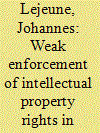| Srl | Item |
| 1 |
ID:
124204


|
|
|
|
|
| Publication |
2013.
|
| Summary/Abstract |
The current round of World Trade Organization (WTO) negotiations-the Doha Round-has significant implications for global health which have received insufficient attention from the global health community. All too often the health implications of global trade agreements are examined only after their conclusion, and are concerned only with intellectual property rights. This paper seeks to move beyond this narrow focus and elucidate the wider health implications of the Doha Round. It explores the negative effect of the Round on state capacity to provide and regulate health services in low-income countries, and the impact it will have on livelihoods among the poor and their ability to access health services. Overall the paper makes the case for greater engagement from the health community with the wto and the Doha Round negotiations beyond the customary focus on intellectual property rights.
|
|
|
|
|
|
|
|
|
|
|
|
|
|
|
|
| 2 |
ID:
129196


|
|
|
|
|
| Publication |
2014.
|
| Summary/Abstract |
Indigenous peoples have been marred for centuries by the incredulous theft of knowledge they obtained, and even resources they use. The thieves are superior, more developed powers that jealously protect the rights to knowledge that is not rightfully theirs. They then refuse to recognize that the true ownership of such precious information belongs to Native Peoples. Indigenous knowledge is stolen without the slightest consideration to the powerful implications that it comes equipped with. The moral repercussions behind such an unethical system leads to loss of Native culture and sustainability and a shift from using Native knowledge and resources for social needs to profit generation. These problems are exacerbated by the use of Intellectual Property Rights (IPR), and the situation has delved to the point where nations bypass indigenous consent and wrongfully patent their knowledge and resources.
Why Indigenous Knowledge Is So Important
Knowledge of the natural world is not limited to science. Peoples spanning across the world have developed, over many years, a set of culturally rich knowledge systems that have been a result of the environments that they live in. Indigenous knowledge revolves around the environment and is of a largely ecological type. It is also referred to, by the World Bank, as the "traditional knowledge of the uses of plants" and even "ethnobotany."
|
|
|
|
|
|
|
|
|
|
|
|
|
|
|
|
| 3 |
ID:
131643


|
|
|
|
|
| Publication |
2014.
|
| Summary/Abstract |
The discrepancy between de jure and de facto protection of intellectual property rights in China remains a heatedly debated topic. Unfortunately, political motivations have distorted the debate from its very beginning, which has not only resulted in a tendency for the different explanations to be played off against each other, but has also reinforced their specific flaws and biases. This study addresses these problems by advancing and integrating the three main explanatory frameworks for explaining the situation. The resulting integrated framework finds that structural factors such as bureaucratic fragmentation and political decentralization matter most in practical terms, but their durability cannot be understood without putting them into context. The findings also suggest that, contrary to most predictions, the future development of intellectual property protection in China might not follow the path laid down by other countries that have modernized in the past.
|
|
|
|
|
|
|
|
|
|
|
|
|
|
|
|